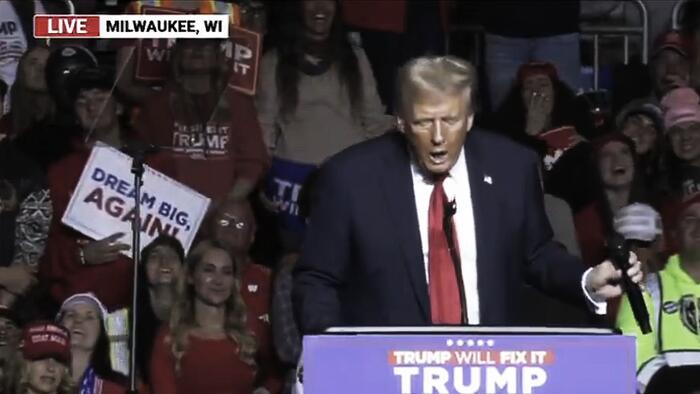In the lead-up to the 2024 presidential election, Steve Watson’s article for Modernity.news discusses a contentious incident involving Donald Trump that has grabbed headlines. On November 2, 2024, social media was abuzz with claims that Trump had simulated oral sex on a microphone stand during a campaign event. These allegations were propagated by the Kamala Harris campaign and various commentators on social media, portraying Trump as unfit for office. These claims sparked outrage among Trump’s supporters, while critics seized upon the moment to highlight their disapproval of the former president’s behavior, which they allege is indicative of a larger trend of unprofessionalism.
Critics of Trump, including various social media users, expressed concern for his lack of decorum, stating that his actions were unbecoming of a presidential candidate. They argued that Trump’s desperate attempts for applause from supporters demonstrate a troubling need for validation. However, supporters of Trump and others contested the narrative, arguing that the microphone incident was being taken completely out of context. They proposed that Trump had been struggling with microphone issues during the rally and was merely illustrating his frustrations rather than engaging in any lascivious behavior. This divide in narrative further illustrated the polarized views surrounding the candidates.
As the election approached, the Democrats were described as desperate, facing backlash for previous attempts to mischaracterize Trump’s statements. Watson points out that just a day prior, claims that Trump had called for the execution of Liz Cheney had been disproven when the full context of his statements was made available. This consistent pattern of misrepresentation, according to critics, showcases the Harris campaign’s strategy of relying on selective video edits and misleading claims rather than substantive discussions of policy and governance. The article underscores a growing skepticism toward the politicization of Trump’s words, especially when it is perceived as an outright attempt to undermine his reputation ahead of the election.
In stark contrast, Watson highlights Trump’s closing arguments from campaign events as evidence of his focus on restoring American economic prosperity and addressing critical issues facing the nation. Trump purportedly emphasized his potential to rescue the economy from the brink of disaster while contrasting his policies with those of Kamala Harris. He positioned himself as the only candidate capable of preventing what he described as an impending economic depression. The article emphasizes Trump’s message of American exceptionalism, painting him as a leader dedicated to improving the welfare of the American people, in sharp contrast to the negative portrayal pushed by his opponents.
Furthermore, the article mentions the celebrity endorsements Harris received, which, while intended to energize her base, were criticized by Trump supporters for lacking the depth and seriousness needed in a political campaign. Rather than engaging in substantive discourse, the Harris campaign appeared to focus on flashy endorsements and social media theatrics—further igniting the debate about the efficacy of celebrity involvement in politics. The juxtaposition of these norms illustrated the different approaches the two campaigns were taking as they sought to capture the electorate’s attention and votes.
As the election day approached, the atmosphere was charged, underscored by allegations, mischaracterizations, and strategic messaging. These incidents reveal not just a fractured political landscape, but also the desperation felt by both campaigns as they vie for credibility and support in a fiercely competitive election cycle. With Trump’s campaign grounded in economic revitalization and patriotic rhetoric, and Harris’s team leaning on social media propaganda and celebrity endorsement, the stage was set for an election steeped in controversy and passionate voter sentiment. The outcome remained uncertain; however, the stakes were clear—each candidate recognized the critical nature of winning over the American public.

